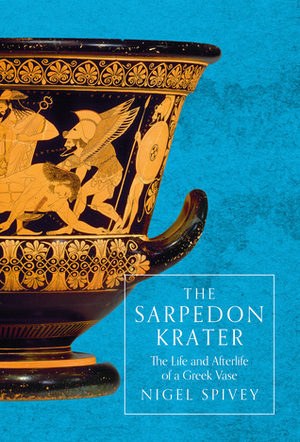
The Sarpedon Krater: The Life and Afterlife of a Greek Vase
by Nigel Spivey
Genres: History, Non-fictionPages: 240
Series: The Landmark Library
Rating:

Synopsis:Once the pride of New York's Metropolitan Museum of Art, the Sarpedon krater is a wine-mixing bowl crafted by two Athenians, Euxitheos (who shaped it) and Euphronios (who decorated it), in the late 6thc BC. The moving image Euphronios created for the krater, depicting the stricken Trojan hero Sarpedon being lifted from the battlefield by ‘Sleep’ (Hypnos) and ‘Death’ (Thanatos), was to have an influence that endured well beyond Antiquity.
Nigel Spivey not only explores the vibrant Athenian civilization that produced the krater, but also reveals how its motifs were elaborated in later Greek art and in the Christian iconography of the Renaissance.
He tells the story of a small object, once consigned to the obscurity of an Etruscan tomb – yet a work of art whose influence extends far beyond its size and former confinement. The Sarpedon Krater is a fascinating case-study of the deep classical roots of the ideas and iconography of western art.
Nigel Spivey’s The Sarpedon Krater is part of a series about “landmarks” in world history and art. Obviously that’s a bit of a metaphor when we’re discussing this mixing bowl, since it’s not a landmark in the same way as Stonehenge is — but in metaphorical terms, it seems it (or at least the themes on it) really was a landmark. Spivey discusses not just the origin of the vase, the artist and their context, but also the afterlife, including the burial in an Etruscan tomb, the looting, and the sale to a museum, along with its brief involvement in the Marion True saga. It also discusses how the motifs may have been copied by — or at least influenced — later artists.
I didn’t know much about this specific object before I started, though I knew a certain amount about symposia, Greek vases, etc, so this filled in some interesting gaps. It’s beautifully illustrated, with close-ups of the krater and other artwork that’s related in some way.
In the end, I don’t know how to evaluate Spivey’s claims about how influential this art was, but it does all hang together pretty well and make sense as an argument — and regardless of that, I enjoyed the contextualisation of the krater and its afterlife.
Rating: 4/5
